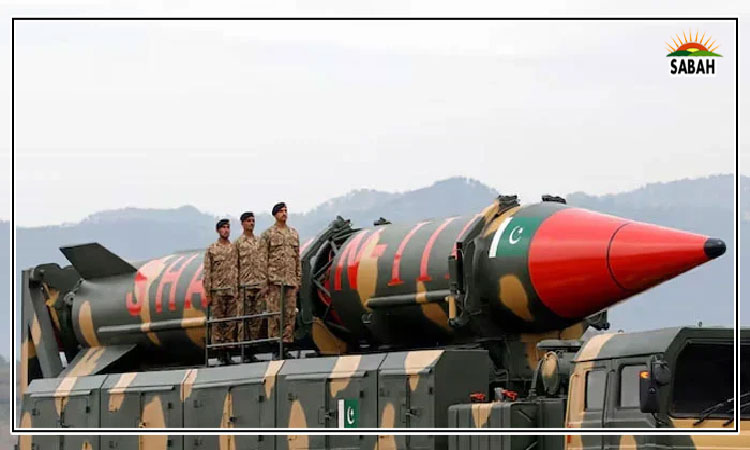Nuclear exceptionalism … Dr Raashid Wali Janjua
The US has imposed sanctions on four entities allegedly involved in nuclear proliferation. These include the National Development Complex (NDC) and three Karachi-based companies: Affiliates International, Akhtar and Sons Private Limited, and Rockside Enterprise.
In April 2024, three Chinese companies and one Belarusian company were sanctioned for exporting missile-enabling technology to Pakistan. More recently, in September, a Chinese research institute and several other companies were sanctioned on similar grounds.
Following the announcement of these sanctions, US government spokesperson Matthew Miller warned that the US would not hesitate to sanction even its allies over disagreements concerning security concerns. However, one cannot help but question why this security concern is not applied universally to other nations with similar profiles.
The US deputy national security adviser, speaking at the Carnegie Endowment for International Peace forum, claimed that Pakistan has developed sophisticated missile technology capable of enabling larger rocket motors, potentially extending the range of its missiles beyond South Asia – even reaching the US. To any unbiased observer, this concern might seem paranoid unless it were applied consistently and based on principles that hold all nations accountable without exceptions.
Pakistan has repeatedly conveyed its nuclear intentions to the US, citing its serious security concerns vis-a-vis a larger adversary in the subcontinental conflict equation. This adversary is heavily armed with nuclear weapons and remains fixated on dismembering Pakistan further, as it did in 1971.
The US strategy of recruiting India as a regional gendarme to counterbalance China may backfire when push comes to shove. India has mastered the art of playing both sides, skillfully leveraging global powers’ fears to extract concessions for itself. It projects itself as a regional bulwark against Chinese expansion while simultaneously engaging in strategic relationships with both China and Russia – two of the primary adversaries of the US.
India has long been indulged in nuclear and missile development domains. In 2008, it received a waiver from the Nuclear Suppliers Group (NSG) restrictions, effectively exempting it from rules that apply to nuclear export controls for countries outside the Non-Proliferation Treaty (NPT). This is particularly galling to morality-conscious members of the global community, given that the NSG itself was created in response to India’s 1974 nuclear test, ironically named ‘Smiling Buddha’.
An even greater deviation from the rules-based order occurred in 2016, when India was granted membership in the Missile Technology Control Regime (MTCR), despite its history of lax nuclear export controls. India continues to avoid adopting comprehensive International Atomic Energy Agency (IAEA) safeguards for its nuclear facilities and remains evasive on nuclear liability laws. It has repeatedly failed to control the illegal smuggling of fissile materials. As recently as August 2024, a gang was caught in illegal possession of highly radioactive material – californium – worth $100 million, echoing three similar incidents in 2021.
The recurrent imposition of sanctions on Pakistan appears to stem from a misplaced ‘range phobia’ in the US. Rooted in the paranoia of its Indian and other allies, this policy unfairly targets Pakistan. Meanwhile, India’s development of intercontinental ballistic missiles (ICBMs), such as the Agni V with a range exceeding 5,000 kilometres, raises no alarms among the so-called international security community. In contrast, Pakistan’s longest-range ballistic missile, the Shaheen III, has a range of 2,750 kilometres, explicitly designed as a deterrent against specific threats. It poses no danger to any other country, including US allies.
The US must understand that its allies might be misleading it into adopting a coercive policy that risks alienating an erstwhile partner. Despite its disappointments, Pakistan has consistently expressed a desire to maintain a mutually beneficial relationship with the US.
The international community must also recognise that unchecked nuclear, ballistic missile defence (BMD), and missile technology support for India, coupled with unjust sanctions against Pakistan, undermine the stability of nuclear deterrence in South Asia. This imbalance threatens to ignite a renewed arms race and increases the risk of conflicts escalating uncontrollably.
Granting nuclear exceptionalism to one party in the deterrence equation poses significant risks to regional and global stability. This lesson must be internalised by global powers. History has shown that the unfair application of sanctions regimes rarely achieves their intended outcomes. Instead, such measures often strengthen the resolve of the sanctioned nations to circumvent these inequitable restrictions.
Domestically, it is crucial for Pakistan’s detractors and uninformed segments of society to grasp the importance of social cohesion and national resolve. A coordinated barrage of negative propaganda targeting the country’s strategic deterrence capabilities – and the associated costs – must be met with clarity and unity.
Social media platforms, in particular, have become fertile ground for such campaigns. However, the lessons from countries like Libya, Iraq, and Syria serve as stark reminders of the consequences of abandoning a robust defence posture. These nations, despite their material and human wealth, now lie in ruins.
The cost of liberty and sovereignty far outweighs the price of maintaining a credible strategic deterrent. Pakistan’s nuclear and missile programmes are not driven by aggression but by the fundamental need to secure its sovereignty against existential threats. Any coercive policies aimed at undermining this capability will not only fail but may also exacerbate regional instability.












